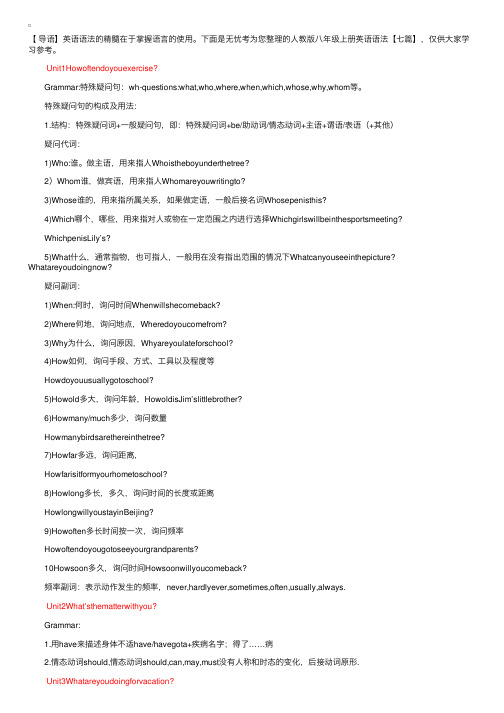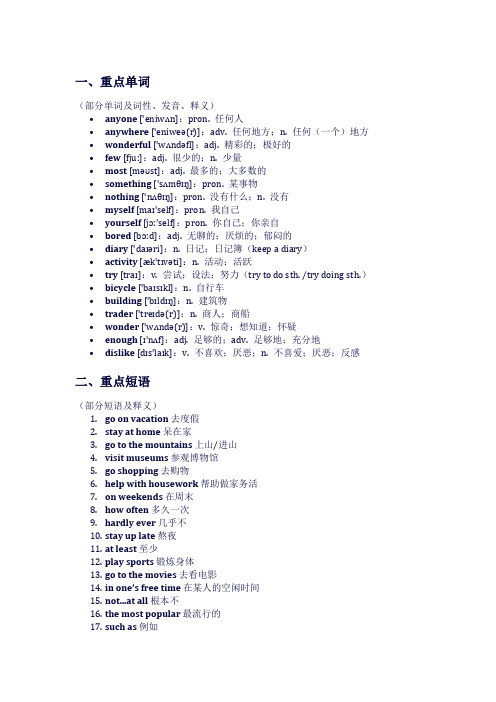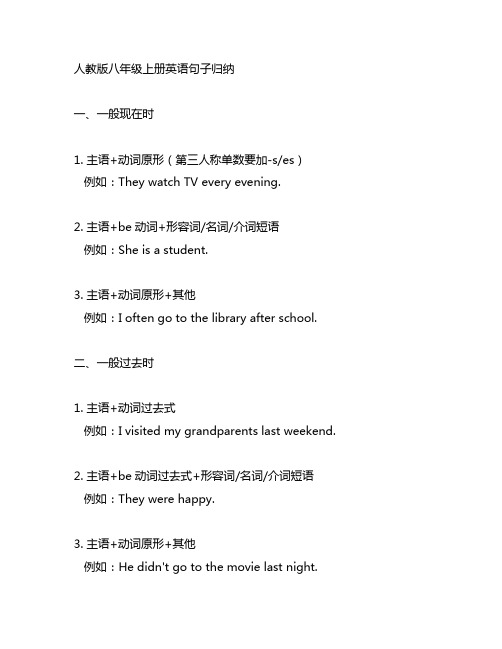人教版八年级上册英语语法全汇总
人教版八年级上册英语语法、短语和知识点总结归纳

人教版八年级上册英语语法、短语和知识点总结归纳一、语法1. 一般现在时- 用法:表示经常性或惯性的动作或状态。
- 结构:主语 + 动词原形 (+ 其他成分)- 示例:I play soccer every weekend.2. 一般过去时- 用法:表示过去某个时间点或一段时间内发生的动作或存在的状态。
- 结构:主语 + 动词过去式 (+ 其他成分)- 示例:She watched a movie last night.3. 现在进行时- 用法:表示现在正在发生的动作。
- 结构:主语 + am/is/are + 动词-ing (+ 其他成分)- 示例:They are studying for the exam.4. 现在完成时- 用法:表示动作或状态发生在过去某个时间点,但与现在有关。
- 结构:主语 + have/has + 动词过去分词 (+ 其他成分)- 示例:I have finished my homework.5. 情态动词- 用法:表示能力、意愿、可能性等。
- 常见的情态动词有 can, could, may, might, must, should, ought to 等。
- 示例:He should go to bed early.二、短语1. as well as- 用法:表示两个事物同时存在或发生。
- 示例:She can speak English as well as Chinese.2. in order to- 用法:为了做某事。
- 示例:They woke up early in order to catch the train.3. by the way- 用法:用于引入一个新的话题或问题。
- 示例:By the way, have you seen the latest movie?三、知识点1. 直接引语和间接引语- 直接引语:用引号括起来的原话。
- 间接引语:将直接引语转述为陈述句或疑问句。
人教版八年级英语上册知识点总结

人教版八年级英语上册知识点总结一、基本语法1.时态:英语时态分为以下几种:现在时、过去时、将来时。
每种时态又分为简单时态、进行时态、完成时态和完成进行时态等。
例如:–现在时:简单现在时: 主语 + 动词原形;进行现在时:主语 + be(am/is/are) + v-ing;完成现在时:主语 + have / has + 过去分词;完成进行现在时:主语 + have / has + been + v-ing。
–过去时:简单过去时:主语 + 动词过去式;进行过去时:主语 + was / were + v-ing;完成过去时:主语 + had + 过去分词;完成进行过去时:主语 + had + been + v-ing。
–将来时:简单将来时:主语 + will / shall + 动词原形;进行将来时:主语 + will / shall + be + v-ing;完成将来时:主语 + will / shall + have + 过去分词;完成进行将来时:主语 + will / shall + have + been + v-ing。
2.倒装句:倒装是指把谓语动词放在主语前面形成的一种语法现象。
如:Only in this way can we solve the problem. (只有这样才能解决问题。
) 倒装句句型格式为:_____+主语(名词或代词)+_____。
在不同的情况下需要用到不同的“辅助动词/助动词”来进行倒装。
3.被动语态:被动语态就是在句子中表达动作的承受者(即主语)的语态。
结构为:被(或受)动责任的动词(to be) + 过去分词。
如:The book was written by him.(这本书是由他写的。
)4.虚拟语气:虚拟语气是指在表示假设,愿望,建议等语气时所使用的一种语态形式。
其结构为:主语+should/could/might/would+(have)+动词原形。
如: If I were you, I would buy this dress(如果我是你,我会买这件衣服。
人教版八年级上册英语语法【七篇】

【导语】英语语法的精髓在于掌握语⾔的使⽤。
下⾯是⽆忧考为您整理的⼈教版⼋年级上册英语语法【七篇】,仅供⼤家学习参考。
Unit1Howoftendoyouexercise? Grammar:特殊疑问句:wh-questions:what,who,where,when,which,whose,why,whom等。
特殊疑问句的构成及⽤法: 1.结构:特殊疑问词+⼀般疑问句,即:特殊疑问词+be/助动词/情态动词+主语+谓语/表语(+其他) 疑问代词: 1)Who:谁。
做主语,⽤来指⼈Whoistheboyunderthetree? 2)Whom谁,做宾语,⽤来指⼈Whomareyouwritingto? 3)Whose谁的,⽤来指所属关系,如果做定语,⼀般后接名词Whosepenisthis? 4)Which哪个,哪些,⽤来指对⼈或物在⼀定范围之内进⾏选择Whichgirlswillbeinthesportsmeeting? WhichpenisLily’s? 5)What什么,通常指物,也可指⼈,⼀般⽤在没有指出范围的情况下Whatcanyouseeinthepicture? Whatareyoudoingnow? 疑问副词: 1)When:何时,询问时间Whenwillshecomeback? 2)Where何地,询问地点,Wheredoyoucomefrom? 3)Why为什么,询问原因,Whyareyoulateforschool? 4)How如何,询问⼿段、⽅式、⼯具以及程度等 Howdoyouusuallygotoschool? 5)Howold多⼤,询问年龄,HowoldisJim’slittlebrother? 6)Howmany/much多少,询问数量 Howmanybirdsarethereinthetree? 7)Howfar多远,询问距离, Howfarisitformyourhometoschool? 8)Howlong多长,多久,询问时间的长度或距离 HowlongwillyoustayinBeijing? 9)Howoften多长时间按⼀次,询问频率 Howoftendoyougotoseeyourgrandparents? 10Howsoon多久,询问时间Howsoonwillyoucomeback? 频率副词:表⽰动作发⽣的频率,never,hardlyever,sometimes,often,usually,always. Unit2What’sthematterwithyou? Grammar: 1.⽤have来描述⾝体不适have/havegota+疾病名字;得了……病 2.情态动词should,情态动词should,can,may,must没有⼈称和时态的变化,后接动词原形. Unit3Whatareyoudoingforvacation? Grammar:现在进⾏时表将来⼀般将来时 表⽰将要做某事或计划打算做某事要⽤到句型“be+doing”其中be是助动词,它有⼈称和单复数的变化。
八年级英语(人教版)上册重点语法知识点

八年级上册重点语法知识点1. 感叹句:感叹句是用来表达喜怒哀乐等强烈情感的句子。
感叹句一般用how或者what开头,句末加感叹号。
what修饰名词,how修饰形容词或副词。
具体句式如下:(1)what引导的感叹句:1)What a(an)+形容词+可数名词的单数形式+主语+谓语!What a clever boy he is!多么聪明的小男孩啊!2)What+形容词+可数名词的复数形式+主语+谓语!What interesting books the children are reading! 孩子们读的书多么有趣啊!3)What+形容词+不可数名词+主语+谓语!What cold weather it is!多冷的天!(2)how引导的感叹句:1)How+形容词或副词+主语+谓语!How lovely the baby is!这孩子真可爱!(lovely为形容词)How fast he runs! 他跑地多快啊!(fast为副词)2)How+形容词+a(an)+可数名词的单数形式+主语+谓语!How heavy a box they are carrying! 他们抬的箱子多重啊!3)How+主语+谓语!How time flies! 时间过得多快!( ) 1. interesting job this is!A.WhatB.HowC.What anD.How an( ) 2. Mo Yan won the Nobel Prize for Literature last year. _______excellent he is!A. HowB. WhatC. What aD. What an( ) 3. ---______day it is!--- Let’s go out and enjoy the sunshine!A. What a lovelyB. How windyC. What a rainyD. How lovely( ) 4. ______ terrible weather we had last Sunday!A. WhatB. What aC.HowD. How a( ) 5. ______useful the book is! We can know well about the city from it.A. WhatB. What aC. HowD. What an( ) 6. _____great picture! Who painted it?A. HowB. WhatC. How aD. What a( ) 7. ______ a beautiful car! I’ve never seen it before.A. WhatB. WhichC.HowD.Whether2. How oftenhow often意为“多久一次”,常用于对时间频率的提问。
人教版八年级英语上册语法总结

人教版八年级英语上册语法总结一、一般现在时。
1. 概念。
- 表示经常或习惯性的动作或状态;表示客观事实或普遍真理。
- 例如:I often get up at six o'clock.(经常的动作)- The earth goes around the sun.(客观真理)2. 动词形式。
- 当主语是第三人称单数(he/she/it等)时,动词要加 -s或 -es。
- 一般情况加 -s,如:like - likes;以s, x, ch, sh, o结尾的动词加 -es,如:go - goes, watch - watches;以辅音字母 + y结尾的动词,把y变为i再加 -es,如:study - studies。
- 当主语不是第三人称单数时,动词用原形。
例如:They play football every day.3. 句型结构。
- 肯定句:主语+动词(原形/第三人称单数形式)+其他。
- 否定句:主语+don't/doesn't+动词原形+其他。
(do not = don't,does not = doesn't)- 一般疑问句:Do/Does+主语+动词原形+其他?回答:Yes, 主语+do/does. No, 主语+don't/doesn't.二、一般过去时。
1. 概念。
- 表示过去某个时间发生的动作或存在的状态。
- 例如:I went to the park yesterday.2. 动词形式。
- 一般动词在词尾加 -ed,如:play - played;以不发音的e结尾的动词加 -d,如:live - lived;以重读闭音节结尾且末尾只有一个辅音字母的动词,双写这个辅音字母再加 -ed,如:stop - stopped;以“辅音字母 + y”结尾的动词,把y变为i再加 -ed,如:study - studied。
还有一些不规则动词,如:go - went, see - saw等。
八年级上册英语语法整理(人教版)

八年级上册英语语法整理(人教版)一. 一般现在时一般现在时用来表达经常发生的动作或习惯,或者描述客观事实。
基本结构主语 + 动词原形(第三人称单数要加-s)+ 其他。
示例1.I like playing football.2.He brushes his teeth every morning.3.They live in Beijing.特殊用法1.表示真理、法则等:The sun rises in the east.2.表示现在状态:She is a doctor.二. 一般过去时一般过去时用来表示过去发生的动作或事实。
基本结构主语 + 动词过去式 + 其他。
示例1.I watched a movie last night.2.He went to the supermarket yesterday.3.They played basketball together.特殊用法1.表示过去的习惯动作:She always walked to school when she was young.2.表示过去的客观事实:He was born in 1990.3.表示过去的愿望:I wish I had a pet dog.三. 一般将来时一般将来时用来表示将来发生的动作或情况。
基本结构主语 + will + 动词原形 + 其他。
示例1.We will have a party next week.2.She will visit her grandparents tomorrow.3.They will go to the beach this weekend.特殊用法1.表示将来的计划:I am going to travel next month.2.表示意愿、决心:I will help you with your homework.3.表示预测:It will rain tomorrow.四. 现在进行时现在进行时用来表示现在正在进行的动作。
人教版丨八年级英语上册全部语法

人教版丨八年级英语上册全部语法-CAL-FENGHAI.-(YICAI)-Company One1人教版丨八年级英语上册全部语法一. 形容词/副词的比较级和最高级1. 形容词/副词的比较级和最高级的构成规则(1)单音节词和少数以-er,-ow结尾的双音节单词,比较级在后面加-er,最高级在后面加-est。
①单音节单词small→smaller→smallestshort→shorter→shortest tall→taller→tallestgreat→greater→greatest②少数以-er,-ow结尾的双音节单词clever→cleverer→cleverestnarrow→narrower→narrowest(2)以不发音e结尾的单音节单词,比较级在原形后加-r,最高级在原级后加-st。
large→larger→largestnice→nicer→nicestable→abler→ablest(3)以一个辅音字母结尾的闭音节(即:辅音+元音+辅音)单词中,先双写末尾的辅音字母,比较级加-er,最高级加-est。
big→bigger→biggesthot→hotter→hottestfat→fatter→fattest(4)以“辅音字母+y”结尾的双音节词,把y改为i,比较级加-er,最高级加-est。
easy→easier→easiestheavy→heavier→heaviest busy→busier→busiesthappy→happier→happiest(5)其他双音节词和多音节词,比较级在前面加more,最高级在前面加most。
beautiful→more beautiful→most beautifuldifferent→more different→most different easily→more easily→most easily(6)有少数形容词、副词的比较级和最高级是不规则的,必须熟记。
(完整word版)人教版八年级英语上册重点语法及句型归纳

1、不定代词A.形容词修饰不定代词时,要后知,做后置定语。
I’ll tell you something interesting.B. 不定代词做主语时,谓语动词用第三人称单数。
Everyone is here.2、一般过去时:在一般过去式的句子中,要注意不规则动词过去式的形式与拼写,要牢记一般过去时的时间状语。
I went to the cinema yesterday. / He hurt his foot last night.3、频度副词:在使用频度副词时,要注意频度副词在句子中的位置是:置于be 动词/情态动词/助动词之后,置于实意动词之前,而且对频度副词疑问要用how often。
He always sits in the front of the classroom. / I am never late for school.------How often do you watch TV?-----Every night.4、形容词、副词的比较等级A.Than 是比较级的标志词,than前的形容词或副词要用比较级。
He is taller than me.B.有比较范围(如:in 或of 短语)时,用最高级。
He is the tallest of the three boys.C.形容词最高级前必须加定冠词the.I’m the best student in my class.D.不规则变化的形容词、副词的比较等级要记牢。
He plays the piano worst.5、动词不定式A. 跟动词不定式作宾语的常用动词要记牢。
如:agree (同意);offer (提出);intend,plan (打算,计划);demand,ask (要求);promise (答应);help (帮忙);prepare (准备);decide (决定);refuse (拒绝);dare (敢于);choose (选择);wish,hope,want,expect ,would like (希望,想要);fail ;(不能;忘记);pretend (假装);manage (设法);determine (决心)。
新人教版八年级上册英语语法,短语和知识点总结

新人教版八年级上册英语语法,短语和知识点总结一、语法1、时态(1)一般现在时:表示经常性或习惯性的动作或存在的状态,常和表示频度的时间状语连用,如:always, usually, often, sometimes, seldom, never等。
(2)一般过去时:表示过去发生的动作或存在的状态,常和表示过去的时间状语连用,如:yesterday, last week, an hour ago, in 2004等。
(3)现在完成时:表示从过去某一时间一直持续到现在的动作或状态,常和表示过去的时间状语连用,如:since, for, already, yet等。
(4)过去完成时:表示过去某一时间之前已经发生或完成的动作,常和表示过去的时间状语连用,如:before, by the time, when, after等。
2、情态动词(1)can:能够、会(2)could:能够、会(过去式)(3)must:必须(4)have to:不得不、必须(5)should:应该、将要(6)would:将要(过去式)3、虚拟语气(1)一般现在时:主语+should/were to +动词原形+其他(2)一般过去时:主语+should/were to have +过去分词+其他二、短语1、make a difference:有影响,有区别2、at once:立即,马上3、take care of:照顾,照料4、in the end:最后,终于5、be good at:擅长于6、as well as:也,又7、keep healthy:保持健康8、come true:实现,成真三、知识点一般现在时:表示经常性或习惯性的动作或存在的状态,常和表示频度的时间状语连用,如:always, usually, often, sometimes, seldom, never等。
八年级上册英语语法总结人教版

八年级上册英语语法总结人教版八年级上册英语语法总结人教版八年级上册英语语法总结人教版主要涵盖了以下几个方面的内容:一般过去时,过去进行时,一般现在时,现在进行时,一般将来时,过去将来时,情态动词,动词不定式以及其他语法要点。
下面将对这些语法点进行详细总结。
一、一般过去时1. 一般过去时表示过去某个时间发生的动作或存在的状态。
2. 动词的过去式变化规则:动词原形+ed:listen – listened以e结尾的动词+d:dance – danced以辅音字母+y结尾的动词,变y为i再加ed:study – studied 以一个辅音字母结尾的重读闭音节动词,双写词尾的辅音字母再加ed:stop – stopped以元音字母+辅音字母结尾的动词,重读闭音节动词,双写词尾的辅音字母再加ed:plan – planned二、过去进行时1. 过去进行时表示过去某个时间正在进行的动作。
2. 过去进行时的构成:was/were + 动词-ing。
3. 过去进行时常与表示过去的时间状语连用,如:when, while, at that time等。
三、一般现在时1. 一般现在时表示经常性或持续性的动作、事实或观点。
2. 动词的一般现在时:第三人称单数主语,动词原形+s:he reads books.主语为非第三人称单数,动词原形:I eat breakfast every day.四、现在进行时1. 现在进行时表示现在正在进行的动作。
2. 现在进行时的构成:am/is/are + 动词-ing。
五、一般将来时1. 一般将来时表示将来要发生的动作或存在的状态。
2. 一般将来时的构成:will + 动词原形。
3. 肯定句:主语 + will + 动词原形。
否定句:主语 + will not/won't + 动词原形。
疑问句:Will + 主语 + 动词原形?六、过去将来时1. 过去将来时表示在过去某个时间点或过去某个动作之前将要发生的动作。
人教版八年级上册英语知识点总结

人教版八年级上册英语知识点总结一、语法重点1. 时态- 一般现在时:表示经常发生的动作或状态,以及普遍真理。
- 一般过去时:描述过去发生的动作或状态。
- 现在进行时:表示正在进行的动作。
- 过去进行时:描述过去某一时刻正在进行的动作。
2. 代词- 人称代词主格:I, you, he, she, it, we, they。
- 物主代词:my, your, his, her, its, our, their。
- 反身代词:myself, yourself, himself, herself, itself, ourselves, yourselves, themselves。
3. 介词- 表示时间的介词:at, on, in。
- 表示地点的介词:at, on, in。
- 其他常用介词:with, by, for, from, to, of。
4. 句型结构- 一般疑问句:使用助动词do/does构成。
- 特殊疑问句:使用疑问词who, what, where, when, why, how 等。
- 否定句:使用助动词do/does后跟not。
5. 词汇- 动词短语:take off, turn on/off, get up, go to bed等。
- 形容词和副词:big/large, small, quick/fast, slowly, carefully等。
- 常用名词:student, teacher, school, family, friend等。
二、词汇与短语1. 学校相关词汇- classroom, teacher, student, library, gym, cafeteria。
- subject, lesson, homework, project, test, exam。
2. 家庭与朋友- family, parent, brother, sister, friend, neighbor。
人教版八年级上册英语知识点汇总

一、重点单词(部分单词及词性、发音、释义)•anyone ['eniwʌn]:pron. 任何人•anywhere ['eniweə(r)]:adv. 任何地方;n. 任何(一个)地方•wonderful ['wʌndəfl]:adj. 精彩的;极好的•few[fjuː]:adj. 很少的;n. 少量•most [məʊst]:adj. 最多的;大多数的•something ['sʌmθɪŋ]:pron. 某事物•nothing ['nʌθɪŋ]:pron. 没有什么;n. 没有•myself [maɪ'self]:pron. 我自己•yourself [jɔː'self]:pron. 你自己;你亲自•bored [bɔːd]:adj. 无聊的;厌烦的;郁闷的•diary ['daɪəri]:n. 日记;日记簿(keep a diary)•activity [æk'tɪvəti]:n. 活动;活跃•try [traɪ]:v. 尝试;设法;努力(try to do sth. /try doing sth.)•bicycle ['baɪsɪkl]:n. 自行车•building ['bɪldɪŋ]:n. 建筑物•trader ['treɪdə(r)]:n. 商人;商船•wonder ['wʌndə(r)]:v. 惊奇;想知道;怀疑•enough [ɪ'nʌf]:adj. 足够的;adv. 足够地;充分地•dislike [dɪs'laɪk]:v. 不喜欢;厌恶;n. 不喜爱;厌恶;反感二、重点短语(部分短语及释义)1.go on vacation去度假2.stay at home呆在家3.go to the mountains上山/进山4.visit museums参观博物馆5.go shopping去购物6.help with housework帮助做家务活7.on weekends在周末8.how often多久一次9.hardly ever几乎不10.stay up late熬夜11.at least至少12.play sports锻炼身体13.go to the movies去看电影14.in one’s free time在某人的空闲时间15.not...at all根本不16.the most popular最流行的17.such as例如18.play tennis打网球19.swing dance摇摆舞20.have a good time玩得愉快三、重点句型(部分句型及示例)1.Where did you go on vacation?o I went to New York City.2.Did you go out with anyone?o No, No one was here. Everyone was on vacation.3.Did you buy anything special?o Yes, I bought something for my father.4.How often do you exercise?o I go to the movies maybe once a month.5.Although many students like to watch sports, game shows are the mostpopular.o虽然很多学生喜欢看体育节目,但游戏节目依然是最受欢迎的。
人教版八年级上册英语句子归纳

人教版八年级上册英语句子归纳一、一般现在时1. 主语+动词原形(第三人称单数要加-s/es)例如:They watch TV every evening.2. 主语+be动词+形容词/名词/介词短语例如:She is a student.3. 主语+动词原形+其他例如:I often go to the library after school.二、一般过去时1. 主语+动词过去式例如:I visited my grandparents last weekend.2. 主语+be动词过去式+形容词/名词/介词短语例如:They were happy.3. 主语+动词原形+其他例如:He didn't go to the movie last night.三、一般将来时1. 主语+will+动词原形例如:We will have a pic next Saturday.2. 主语+be going to+动词原形例如:She is going to visit her uncle tomorrow.3. 主语+动词原形+其他例如:They are going to watch a movie this weekend.四、现在进行时1. 主语+be动词+动词现在分词例如:I am doing my homework now.2. 主语+be not+动词现在分词例如:She is not playing basketball at the moment.3. 疑问句:Be动词+主语+动词现在分词+其他?例如:Are they watching TV now?五、过去进行时1. 主语+was/were+动词现在分词例如:I was studying when my friend called me.2. 主语+was/were not+动词现在分词例如:He was not sleeping at midnight.3. 疑问句:Was/Were+主语+动词现在分词+其他?例如:Were they w本人ting for the bus at 8 o'clock?六、一般过去时与过去进行时的区别一般过去时:表示过去某个时间发生的动作或存在的状态。
人教版八年级上英语语法表

人教版八年级上英语语法表本文档旨在提供人教版八年级上册英语语法表。
以下是一些常用的语法规则和例子,供研究参考。
1. 一般现在时一般现在时用于描述常规行为、惯、事实或客观真理。
1.1 现在时的构成主语 + 动词原形(第三人称单数加-s)例如:- I like apples.(我喜欢苹果。
)- She goes to school by bus.(她坐公交车上学。
)- The sun rises in the east.(太阳从东方升起。
)1.2 现在时的用法- 表示经常性的动作或惯- 表示客观事实或真理- 表示现况的状态或存在- 表示感观经验2. 一般过去时一般过去时用于描述过去发生的事情或存在的状态。
2.1 过去时的构成主语 + 动词过去式例如:- They visited the museum yesterday.(昨天他们参观了博物馆。
)- She lived in London three years ago.(三年前她住在伦敦。
)- We played basketball last weekend.(上周末我们打篮球。
)2.2 过去时的用法- 描述过去的经历或事件- 表示过去存在的状态- 表示过去的惯或常规行为3. 现在进行时现在进行时用于描述正在进行的动作或暂时的情况。
3.1 现在进行时的构成主语 + be动词(am/is/are) + 现在分词例如:- I am reading a book now.(我现在正在读书。
)- She is watching TV at the moment.(她此刻正在看电视。
)- They are having dinner in the restaurant.(他们正在餐厅吃饭。
)3.2 现在进行时的用法- 描述当前正在进行的动作- 表示暂时的情况或状态- 使用表示未来的时间副词(如now,at the moment)4. 一般将来时一般将来时用于表示将来发生的动作或存在的状态。
八年级上册英语语法人教版

八年级上册英语语法人教版一、一般过去时。
1. 概念:表示过去某个时间发生的动作或存在的状态。
2. 构成:主语 + 动词的过去式 + 其他。
3. 常见的时间状语:yesterday(昨天), last week(上周), ago(以前), in 2000(在 2000 年)等。
二、频度副词。
1. always(总是), usually(通常), often(经常), sometimes(有时), seldom(很少), never(从不)2. 频度副词在句中的位置:通常位于行为动词之前,be 动词、助动词或情态动词之后。
三、形容词和副词的比较级和最高级。
1. 构成规则:- 一般在词尾加 -er / -est。
- 以不发音的字母 e 结尾的,加 -r / -st。
- 重读闭音节词,双写末尾辅音字母,再加 -er / -est。
- 以“辅音字母 + y”结尾的词,改 y 为 i,再加 -er / -est。
- 多音节词和部分双音节词,在前面加 more / most。
2. 用法:- 比较级用于两者之间的比较,“A + be + 比较级 + than + B”四、宾语从句。
1. 概念:在句子中作宾语的从句叫宾语从句。
2. 宾语从句的语序:要用陈述句语序,即“连接词 + 主语 + 谓语 + 其他”。
3. 宾语从句的时态:- 主句是一般现在时,从句根据实际情况使用相应时态。
- 主句是一般过去时,从句要用相应的过去时态。
五、if 引导的条件状语从句。
1. 结构:if + 一般现在时,主语 + will / can / may + 动词原形。
2. 含义:如果……,(主语)将/能/可以……。
- 1、下载文档前请自行甄别文档内容的完整性,平台不提供额外的编辑、内容补充、找答案等附加服务。
- 2、"仅部分预览"的文档,不可在线预览部分如存在完整性等问题,可反馈申请退款(可完整预览的文档不适用该条件!)。
- 3、如文档侵犯您的权益,请联系客服反馈,我们会尽快为您处理(人工客服工作时间:9:00-18:30)。
八年级语法全汇总一. 询问某人的健康问题及遭到麻烦的表达方法1. 询问某人患了何种疾病或遇到了何种麻烦时,常用以下几种结构来表达:What’s the matter (with sb.)?(某人)怎么了?What’s wrong (with sb.)?(某人)怎么了?What’s the trouble with sb? 某人出什么事了?What happened to sb? 某人发生了什么事?Are you OK? 你没事吧?Is there anything wrong with sb.?某人有不舒服/麻烦吗?2. 要表达身体疼痛或不舒服,可用以下结构:①某人+have/has+病症The twins have colds.双胞胎感冒了。
②某人+have/has+a+headache/toothache/stomachache/backache/earache. She had a stomachache last night. 她昨晚肚子痛。
③某人+have/has+a+sore+发病部位He has a sore throat. 他喉咙痛。
④某人+hurt(s)+身体部位或反身代词He hurt his leg. 他的腿受伤了。
⑤某部位+hurt(s).My head hurts badly. 我头痛得厉害。
⑥某人+have/has+a pain+in one’s+身体部位I have a pain in my chest. 我胸口痛。
⑦(There is) something wrong with one’s+身体部位There is something wrong with my right eye. 我的右眼有毛病。
⑧其他表达方式She has a heart trouble. 她有心脏病。
He got hit on the head. 他头部受到了撞击。
She cut her finger. 她割破手指了。
二. 情态动词should的用法1. should为情态动词,意为“应该;应当”,否定式为shouldn’t,其后接动词原形,无人称和数的变化。
常用来表示征询意见、建议、劝告、要求或义务等。
You should drink more water. 你应该多喝水。
He should put his head back. 他应该把头后仰。
We should try our best to help him. 我们应当尽力去帮助他。
You shouldn‘t watch TV. 你不应该看电视。
2. should用于主语为第一人称的疑问句,表示征询意见。
Should I put some medicine on it? 我应当给它敷上药吗?Should we tell her about it? 我们应该告诉她这件事吗?3. 在英语中,表示建议的说法有很多,而且都是中考考查的重点。
主要结构有:①Would you like (to do) sth?你想要/愿意(做)某事吗?Would you like to play basketball with me?你想要和我一起打篮球吗?②Shall I/we do sth? 我/我们做某事好吗?Shall we go to the zoo tomorrow?明天我们去动物园,好吗?③Why not do sth? 为什么不......呢?Why not join us?为什么不加入到我们当中来呢?④How/What about doing sth? 做某事怎么样?How about going swimming?去游泳怎么样?⑤Let’s do sth. 让我们做......吧。
Let’s go home.咱们回家吧。
⑥You’d better (not) do sth 你最好(不)要做某事。
You’d better not go there alone.你最好不要一个人去那儿。
三. 反身代词英语中共有八个反身代词,在使用时应注意和它所指的相应的对象在人称、性别和数上保持一致。
第一人称第二人称第三人称单数myself yourself himself/herself/itself复数ourselves yourselves themselves反身代词的用法1. 可用作宾语,指的是宾语和主语表示同一个或同一些人或事物。
如:Maria bought herself a scarf.We must look after ourselves very well.2. 可用作表语,指的是表语和主语表示同一个或同一些人或事物。
如:She isn’t quite herself today.3. 可用作主语或宾语的同位语,常用来加强语气。
如:She herself will fly to London tomorrow.I met the writer himself last week.4. 用在某些固定短语当中。
如:look after oneself / take care of oneself 照顾自己teach oneself sth./learn sth. by oneself 自学enjoy oneself 玩得高兴,过得愉快help oneself to sth 请自用……(随便吃/喝些……)hurt oneself 弄伤自己say to oneself 自言自语leave sb. by oneself 把某人单独留下【注意】反身代词不能单独做主语,但可以做主语的同位语,起强调作用。
如:我自己能完成作业。
(误)Myself can finish my homework.(正)I myself can finish my homework. / I can finish my homework myself.四. 一般将来时一般将来时表示将来某个时间要发生的动作或状态,或将来经常发生的动作或状态。
一般将来时的基本结构1. will+动词原形否定式:will not=won't一般疑问式:will/shall+主语+动词原形+其他?特殊疑问式:特殊疑问词+一般疑问式?—Will he help you with your English tonight?今天晚上他会帮助你学习英语吗?—Yes, he will./No, he won't.是的,他会。
/不,他不会。
—When will you arrive for America?你什么时候去美国?—Tomorrow.明天。
2. am/is/are going to +动词原形否定式:am/is/are not going to +动词原形一般疑问式:am/is/are +主语+ going to + 动词原形+其他?特殊疑问式:特殊疑问词+一般疑问式?Look at the dark clouds. There is going to be a storm.看那乌云,快要下雨了。
Is he going to collect any data for us?他会帮我们收集数据吗?What are you going to do tomorrow?明天你打算作什么?3. will+动词原形与am/is/are going to +动词原形的用法区别will+动词原形与am/is/are going to +动词原形的用法虽然都表示将来发生动作或情况,一般情况下能互换。
但它们的用法是有区别的。
will主要用于在以下三个方面:(1)表示主观意愿的将来。
They will go to visit the factory tomorrow.明天他们将去厂参观工厂。
(2)表示不以人的意志为转移的客观的将来。
He will be thirty years old this time next year.明年这个时候他就(将)三十岁。
(3)表示临时决定,通常用于对话中。
—Mary has been ill for a week.玛丽病了一周了。
—Oh, I didn't know. I will go and see her.噢,我不知道。
我去看看她。
be going to主要用于以下两个方面:(1)表示事先经过考虑、安排好打算、计划要做某事。
Dad and I are going to watch an opera this afternoon.今天下午我和爸爸打算去看歌剧。
(2)表示根据目前某种迹象判断,某事非常有可能发生,表示推测。
Look! There come the dark clouds. It is going to rain.瞧!乌云密集。
天要下雨了。
五. 动词不定式(to do)的用法1. 作主语为避免句子的头重脚轻,常用it作为形式主语,而真正的主语动词不定式后置。
常用句型:It +be+adj./n.+(for/of sb.) to do sth./It takes sb. some time to do sth.2. 作宾语动词want, decide, hope, ask, agree, choose, learn, plan, need, teach, prepare常接动词不定式作宾语。
3. 作(后置)定语常用于“have/has+sth.+to do”或“It‟s time to do sth.”等结构中。
4. 作宾语补足语tell, ask, want, invite, teach, like, call等可接带to的动词不定式作宾语补足语,构成tell/ask/want /call/invite sb. to do sth.结构。
【注意】动词不定式作使役动词和感官动词的宾语补足语时应省去to:“一感(feel),二听(listen to, hear),三让(let, make, have,四看(look at, see, watch, notice),半帮助(help)”。
5. 动词不定式作状语主要用来修饰动词,表示目的,结果或原因。
为了强调目的,有时可以把动词不定式放在句首,或在不定式前加in order (to) 或so as (to) “为了,目的是”。
六. Could you please...?句型1. 请求别人时通常用此句型,也可以说Can you...please?情态动词could或can在这里均表示请求,在意思上无区别,但是用could在于其显得更委婉、客气、诚恳。
在日常生活中常使用could you/I...?若在句末加上please,则显得更礼貌。
Could you help me find my book, please?你能帮我找到我的书吗?2. 对could you/I...?的问句作出肯定回答,常用“sure/certainly/of course”等;如果作否定回答,常用“sorry或oh, please don’t”。
